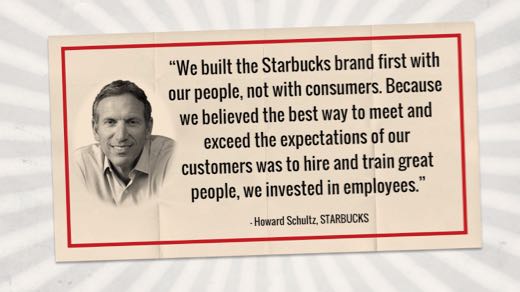Last week I spoke with an audience of CEOs sharing some Starbucks Tribal Knowledge. During the presentation I shared the Starbucks “Tribal Truth” of The Employee Experience Matters. I framed the conversation by sharing this quote from Starbucks’ Howard Schultz:

During the conversation, I discussed how the “employee experience matters” at Starbucks because the company recognizes competitors can replicate the products Starbucks serves, but competitors can’t replicate the Starbucks people serving their products to customers.
Its people, not its products that make Starbucks, Starbucks.
(Sure, having a variety of tasty coffee beverages helps too but coffee comes second at Starbucks. Really, it does.)
Just as Howard said in the above quote, Starbucks seeks to connect first with employees and second with customers. WHY? Well, simply put … Starbucks knows employees that are treated well, will in turn, treat customers well.
To treat its workforce well, Starbucks offers all full-time and part-time employees the opportunity to receive full healthcare benefits, stock options/discounted stock purchase plans, and other meaningful benefits. The company’s reputation for being an employer of choice has been recognized countless times. Most recently, in January 2007, Starbucks was ranked as the 16th “Best Company to Work For in America” by Fortune Magazine.
Following my presentation, I was asked when Howard shared this quote about putting employees ahead of customers. The CEO who asked the question wanted to know if this was said in hindsight or with foresight.
I paused … and paused again … only to give a semi-accurate answer. I replied by saying something like, “The quote came from Howard’s book published in 1997. And maybe this employee first philosophy wasn’t articulated as such, but it was manifested as such.”
However, the reality is this Employee First philosophy was articulated as such early on in Starbucks history back when Howard was operating his Il Giornale coffee bar venture.
(Howard Schultz actually left Starbucks in 1985 to open up Il Giornale—his vision of what a coffee company should be. Il Giornale was an Italian-inspired coffee bar serving lattes, cappuccinos, brewed coffee, pastries, and sandwiches. In 1987, the original founders of Starbucks decided to sell the company and Howard jumped at the opportunity to merge his Il Giornale coffee bar company with Starbucks Coffee and thus signaling the beginning of the Starbucks experience we’ve come to enjoy.)
I bring this to our attention because it was at Il Giornale where Howard Schultz clearly articulated the Employee First philosophy which has since become an integral part of the Starbucks company culture ethos.
Many years ago an old school Starbucks partner shared with me an internal memo from Howard’s Il Giornale days (dated May 19, 1986) that outlined the early beginnings of Starbucks Employee First philosophy. In this vintage memo (pdf link), Howard writes …
“The attitudes of managers towards their people are of primary importance. Employees should be able to trust the motives and integrity of their supervisors. It is the responsibility of management to create a protective environment where Il Giornale values flourish. We believe our employees will develop a commitment to excellence when they are directly involved in the management of their areas of responsibility. The team effort maximizes results, minimizes costs and allows our employees to have authorship and integrity in their accomplishments as well as sharing in the financial rewards of their individual and team efforts.”
“We believe in hiring exceptional people who are willing to work for excellent results. In exchange, we are committed to the development of our good people by identifying, cultivating, training, rewarding and promoting those individuals who are committed to moving our company forward.”
“Together, we can establish the [Il Giornale] difference.”
So … the Starbucks Employee First philosophy was indeed created with foresight. For more, read this vintage Il Giornale internal memo.